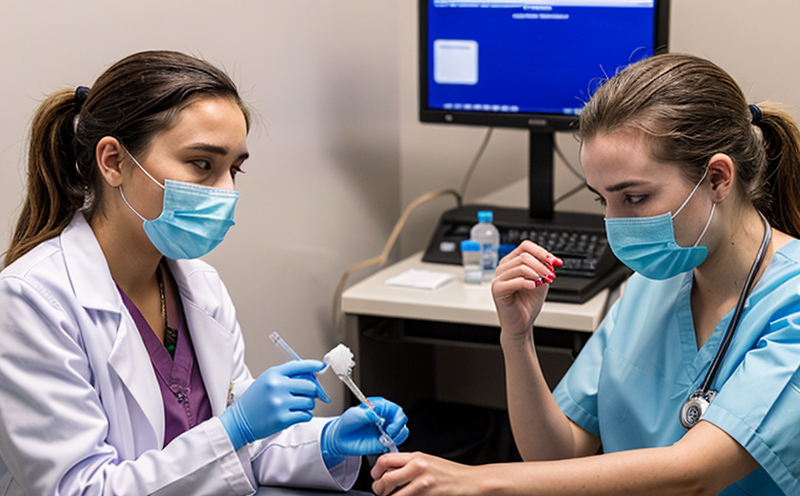CLSI M27 Antifungal Susceptibility Testing
The CLSI (formerly known as NCCLS) M27 Antifungal Susceptibility Testing is a crucial method used to determine the sensitivity of fungi to antifungal agents. This standardized testing process is pivotal for guiding patient management and ensuring effective treatment regimens in various healthcare settings, including hospitals, clinics, and research laboratories.
The CLSI M27 protocol involves several steps that ensure accurate and reliable results. Specimen collection plays a significant role; it typically includes isolates of fungi from patients who are suspected or known to have infections caused by these microorganisms. Proper specimen preparation is essential for obtaining consistent and reproducible test outcomes.
The testing process itself requires a careful balance between laboratory techniques and interpretation of results. Culture methods are employed to grow the isolated fungal strains on appropriate media. Once growth is confirmed, the isolates undergo susceptibility testing using various antifungal agents according to the CLSI guidelines. This step-by-step approach ensures that only clinically relevant data is used for decision-making.
The significance of this test cannot be overstated in clinical microbiology. It helps healthcare professionals tailor therapy more effectively by providing precise information about which antifungal drugs are likely to be effective against specific fungal pathogens. This not only enhances patient outcomes but also reduces the likelihood of drug resistance, a growing concern in medical practice.
By adhering strictly to CLSI M27 protocols, laboratories maintain high standards of quality and consistency. The use of standardized methods ensures that results are comparable across different facilities worldwide, facilitating better collaboration among healthcare providers.
- Consistency: Standardized procedures ensure consistent results.
- Reliability: Reduces variability in testing outcomes.
- Compliance: Ensures adherence to regulatory and clinical standards.
- Precision: Accurate identification of sensitive and resistant strains.
In summary, CLSI M27 Antifungal Susceptibility Testing is a vital component in the fight against fungal infections. Its role in guiding treatment decisions cannot be underestimated, making it an indispensable tool for healthcare professionals focused on improving patient care through evidence-based practices.
Benefits
The implementation of CLSI M27 Antifungal Susceptibility Testing offers numerous advantages to laboratories and clinicians alike. Firstly, it provides a standardized approach that enhances the reliability and consistency of test results across different institutions. This uniformity is critical for ensuring accurate diagnoses and effective treatment plans.
Secondly, by following this protocol, healthcare providers can make more informed decisions regarding antifungal therapy. Knowing exactly which drugs are likely to be effective against specific fungal isolates allows clinicians to choose the most appropriate treatments promptly, potentially improving patient outcomes significantly.
The use of CLSI M27 also helps in reducing the emergence of drug-resistant strains. Through precise testing and targeted therapies, healthcare facilities can prevent situations where resistant organisms gain a foothold, which is becoming an increasingly pressing issue globally.
Moreover, this standardized test supports continuous quality improvement within laboratories. Regular audits against these standards help maintain high levels of performance and accuracy in diagnostic microbiology services.
Why Choose This Test
- Precision: CLSI M27 ensures highly accurate results through standardized procedures.
- Rigor: The protocol is rigorous and reliable, minimizing variability in outcomes.
- Standardization: It adheres to internationally recognized guidelines, ensuring consistency across different laboratories.
- Compliance: Compliance with CLSI M27 helps meet regulatory requirements for quality assurance.
- Advanced Technology: Utilizes advanced laboratory instruments and techniques for precise testing.
- Expertise: Requires trained personnel familiar with the nuances of CLSI protocols.
The CLSI M27 Antifungal Susceptibility Testing is chosen by laboratories that prioritize accuracy, consistency, and compliance. It offers a robust framework for diagnosing fungal infections accurately and guiding effective treatment strategies. This test not only supports clinical decision-making but also contributes to the broader goal of improving public health through evidence-based practices.
International Acceptance and Recognition
The CLSI M27 Antifungal Susceptibility Testing protocol is widely recognized internationally for its role in ensuring accurate and reliable antifungal susceptibility testing. This standardized method has been adopted by numerous institutions across the globe, including major healthcare providers, academic centers, and regulatory bodies.
Many countries have implemented CLSI guidelines as part of their national standards for diagnostic microbiology. For instance, the United States, Europe, and other regions often refer to CLSI M27 when specifying requirements for antifungal susceptibility testing in clinical laboratories. The protocol's widespread acceptance underscores its importance in global healthcare.
The recognition of this test extends beyond mere compliance; it reflects a commitment to excellence in diagnostics. Laboratories that adopt CLSI M27 demonstrate their dedication to maintaining high standards and providing accurate, reliable data for patient care.





